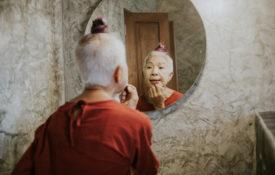-
Daniel Kahneman: How Companies Can Improve Their Hiring Process
As a young lieutenant, Daniel Kahneman was asked to improve the Israeli army’s haphazard process of assessing capabilities among combat-eligible recruits. Armed with a psychology degree and infantry experience, he brashly made up some criteria, developed questions to elicit relevant facts, and insisted interviewers ask only what he specified. Each recruit would be given a score on each criterion, and the overall “Kahneman score” would be used in deciding how demanding a role was suitable. His structured system worked. In the decades ahead, he reports, the army determined that the system really did result in better assignments.
-

Reminders of Years Left, Not Lived, Motivate Older People
For successful messaging to older adults, ditch the stereotypes, consider their future time horizons, and help them savor the moments they can enjoy.
-
How Our Friends Affect Our Food
In 2013, Jon Stewart, then the host of The Daily Show, set aside the program’s usual focus on politics to talk about something more important: pizza, specifically Chicago-style deep-dish pizza. “Deep-dish pizza is not only not better than New York pizza,” Stewart explained. “It’s not pizza.” Then, after several more minutes railing against the dish, he concluded, “Here’s how I know I’m right: You call it ‘Chicago-style pizza,’ ‘deep-dish pizza,’ ‘stuffed pizza.’” The New York City–born comedian pulled a thin slice of pizza from under his desk. “You know what we call this? Pizza.” Taste is an interesting thing.
-
The Real Reason You and Your Neighbor Make Different Covid-19 Risk Decisions
Some people are comfortable going to concerts and clubs now. Others draw the line at indoor dining. And some are avoiding nearly all gatherings. People’s assessment of what is safe has varied wildly during the Covid-19 pandemic—often leaving us baffled about why our risk decisions differ so sharply from those of our neighbors, friends and family members. Now, scientists are starting to better understand why. Recent research shows that, while politics and geography play a role, other factors are often more important in determining how we make decisions about Covid-19 risks.
-
Group Think
How do the groups you identify with shape your sense of self? Do they influence the beer you buy? The way you vote? Psychologist Jay Van Bavel says our group loyalties affect us more than we realize, and can even shape our basic senses of sight, taste and smell. ...
-
What We Do and Don’t Know About Kindness
Since the pandemic began, people tell me they've been thinking a lot more about kindness. Maybe they've noticed the mutual aid groups that have sprung up around the world to help during lockdowns, or perhaps it's because the cessation of normal everyday life has forced them to reconsider their values and what really matters in life. Kindness might once have been considered something of a soft topic, but it has begun to be taken seriously within academic research. When developmental psychologist Robin Banerjee – who is leading a new study on kindness in partnership with the BBC – surveyed past research, he found just 35 papers on kindness in psychology journals in the whole of the 1980s.

